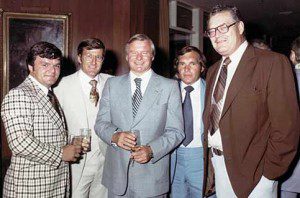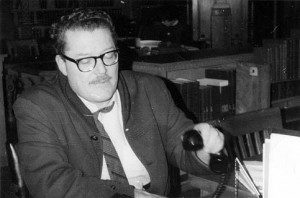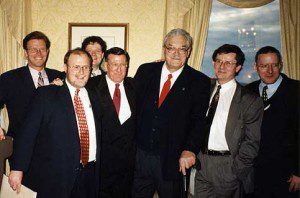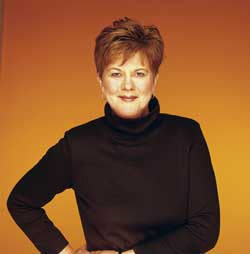King of the Hill
Douglas Fisher, who died in September, wrote thousands of columns over four decades. His old-school reportage earned the one-time MP the moniker "Dean of the Parliamentary Press Gallery"
When a radio or television report suggested something was “unprecedented in Canada,” Douglas Fisher would probably guffaw and shake his head. He knew it probably wasn’t. And who could argue with him? Even if you drummed up the courage to confront his massive six-foot-five frame, you would be faced with a man who could recall the goings-on of Canadian politics back to the days when Louis St. Laurent was prime minister.
Fisher, who died in September, a day shy of his 90th birthday, was a huge man-in reputation, vocabulary and voice. After decades of participating in, and writing about, politics in Ottawa, Fisher estimated he had written more than 2,400 columns for the Toronto Sun alone. While many political reporters around him focused on “gotcha” journalism and dreamed of sensational exposés, Fisher wrote thoughtful, informed criticism. “He was probably the most insightful and knowledgeable person writing about politics in Ottawa,” says Peter Worthington, former editor-in-chief of the Sun. That understanding came, in part, from poring over Hansard reports daily. This, coupled with his previous experience as an MP, meant that his columns showed a far greater understanding of the inner workings of Parliament. “So few people understand how politics actually work,” says Susan Reisler, a former Hill reporter. But Fisher was one of those people.
His political career began in 1957. A high school history teacher in Port Arthur, Ontario (now a part of Thunder Bay), he ran for Parliament. And in a stunning upset for the Co-operative Commonwealth Federation, he defeated Liberal incumbent C.D. Howe, one of the most powerful politicians in the country and a man known as the “Minister of Everything.”
But Fisher complained that an MP’s salary of $10,000 a year was insufficient for a married man with five sons, residences in his riding and in Ottawa, and copious collect calls from constituents. So he wrote a freelance article for the Toronto Telegram in 1962 and eventually became a staple at the paper (and at its successor, the Sun), appearing thrice weekly until his retirement in 2006. The fiercely loyal World War II veteran also contributed to Legion Magazine, and was a booming presence on television and radio. His broadcast gigs included hosting CJOH’s Insight, a political interview and debate program, and regularly appearing on CTV’sQuestion Period.
But it was in front of his typewriter where Fisher would often be found. In his National Press Building office, he would knock out 70 words a minute (index fingers only), surrounded by all that epitomizes journalism. There was his desk littered with press releases, books piled to the ceiling (biographies, Royal Navy histories, Zane Gray westerns), dozens of filing cabinets lining the walls and, until he quit smoking, ash-trays filled with the butts of cigarettes he had rolled himself while driving to work. Every cabinet was filled with meticulously organized clippings accumulated over the course of his career. As Globe and Mail columnist Roy MacGregor jokes, “He was sort of the original Google.”
Though organized, Fisher had trouble being brief. Worthington says the Sun‘s audience never seemed to care about the buried leads, but admits, “I had a little trouble with him writing short.” The columnist, who had written longer pieces for the Telegram, grumbled when the Sun reduced his word limit to 600. But he relented when the shorter pieces attracted more readers.
Regardless of the word count, Fisher’s writing was not weighed down by fanciful prose or jargon. Anne Dawson, former Sun Media bureau chief, respected his ability to take complicated political concepts and break them down so a reader unfamiliar with the complexities of Canadian government could understand. His blunt style revealed an upbringing in the backwoods of northern Ontario, “despite his intellectual weight,” says Andrew Cohen, who covered Parliament Hill for the United Press International wire service in the 1980s.
Fisher rarely barbed his words in a partisan or antagonistic manner, but that didn’t mean that he wasn’t critical of his subjects. When reviewing The Secret Mulroney Tapes by Peter Newman, with whom he had been close, Fisher held little back, writing, “I think this is the poorest book yet in a score Newman has produced about Canadian politics, politicians, tycoons and companies.”
This mingling of respect and brutal honesty characterized his “testy relationship,” as son Tobias calls it, with Pierre Trudeau. Fisher first encountered “the new guy from Québec” in the Parliament’s steam room. The rivalry of wits and words would last their entire careers. Fisher was always critical of Trudeau’s use of the War Measures Act during the October Crisis in 1970. He asked Trudeau if he would change the Act every time he got the chance, up until, and including, Trudeau’s very last press conference. Once when Trudeau quoted a philosopher, Fisher countered with the rest of the quote in question, thus negating Trudeau’s point. Tobias suspects this annoyed Trudeau no end.
In his final column, which ran in July 2006, Fisher, admitted, “Aging, of course, has made me more conservatively-minded.” His own politics aside, he didn’t hide his disdain for the increasingly scrappy and theatrical nature of Ottawa politics. “He saw debate die, and it hurt him greatly,” says MacGregor. Even fellow journalists couldn’t escape his ire. His son Matthew says, “He hated ‘gotcha’ journalism,” and the notion that reporters were “the natural opposition.”

Left to Right: Marcel Dionne, Alan Eagleson, Bill Davis, André Boudrias, Douglas Fisher in the mid 1970s
courtesy of Mark Fisher
George Hoff, an instructor at Centennial College who wrote his journalism thesis on Fisher’s career, says the columnist scoffed at reporters who relied on Freedom of Information requests. He preferred to treat his contacts and sources with the same level of respect that he had for the institutions of government that they represented. Despite his grim views on much of modern reportage, Fisher still read three newspapers a day at his retirement home, and watchedQuestion Period and Don Newman’s Politics intently.
“At 86 and retiring,” he wrote in that final column, “I am as positive about our country as I was in my 20s, coming home from the war.” While that might sound jingoistic, there’s little reason to doubt Fisher’s unqualified sense of optimism. He maintained complete confidence in the potential of both the politics and journalism of Canada, setting an example for both. “Everyone trusted him,” says Worthington, “which is, I think, as much as we can ask for.”
by Jonathan Ore
Jonathan Ore was the Chief Copy Editor for the Spring 2010 issue of the Ryerson Review of Journalism.















































